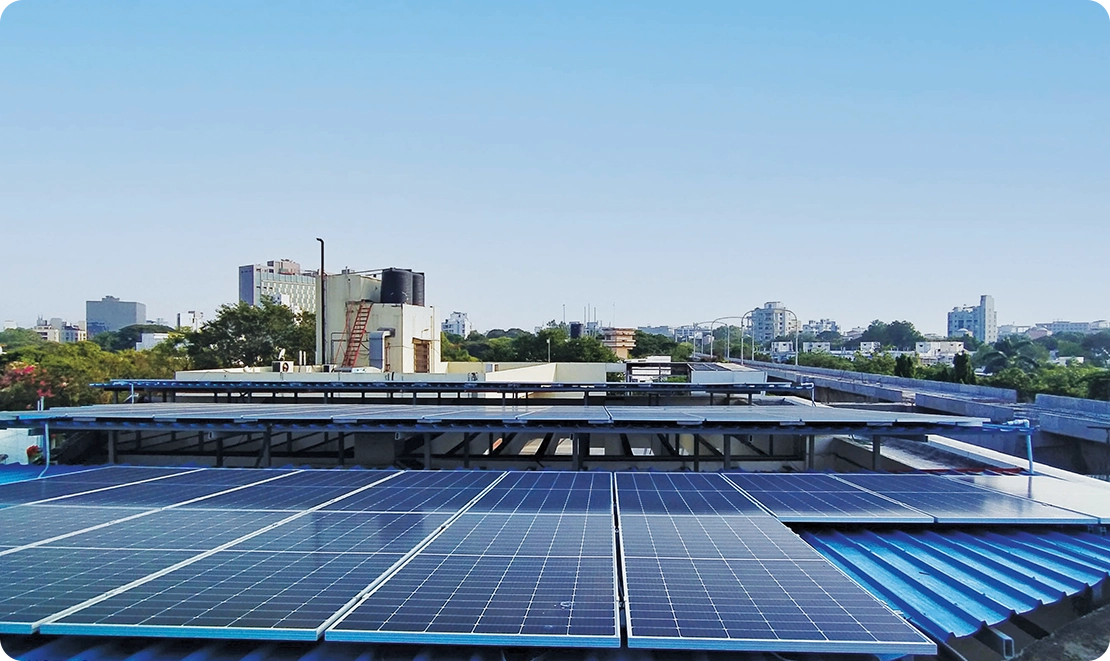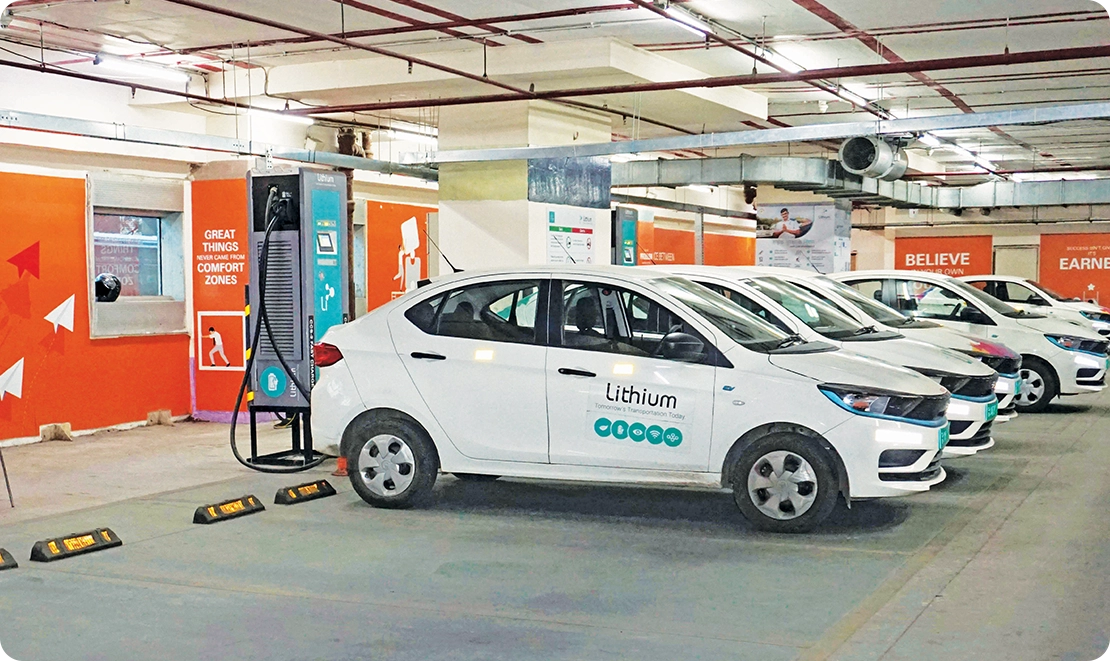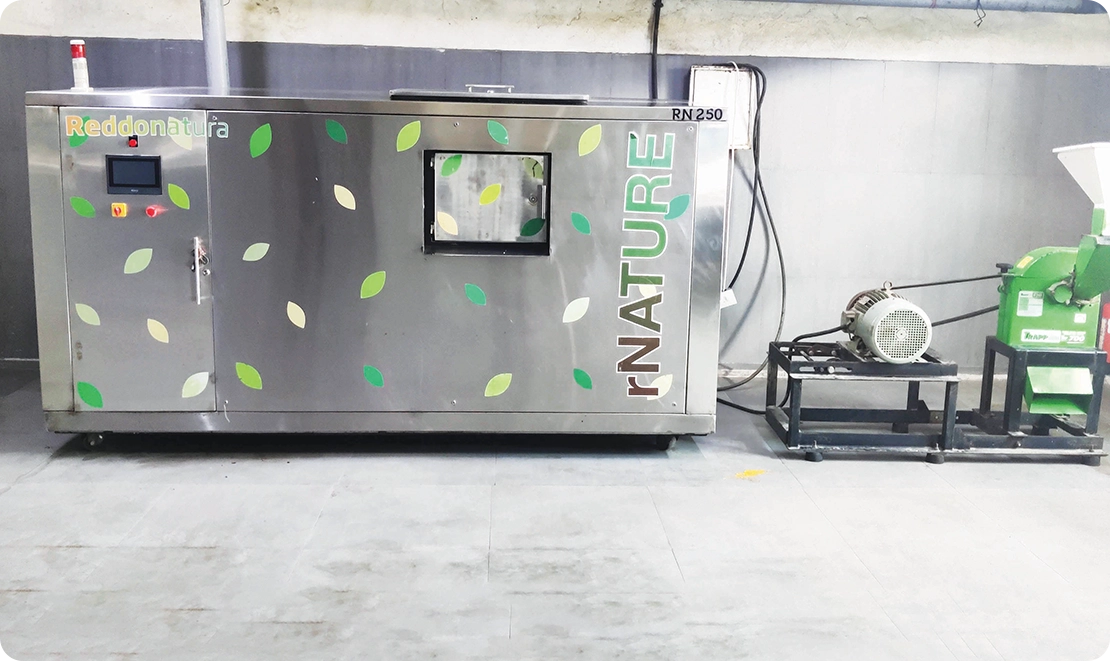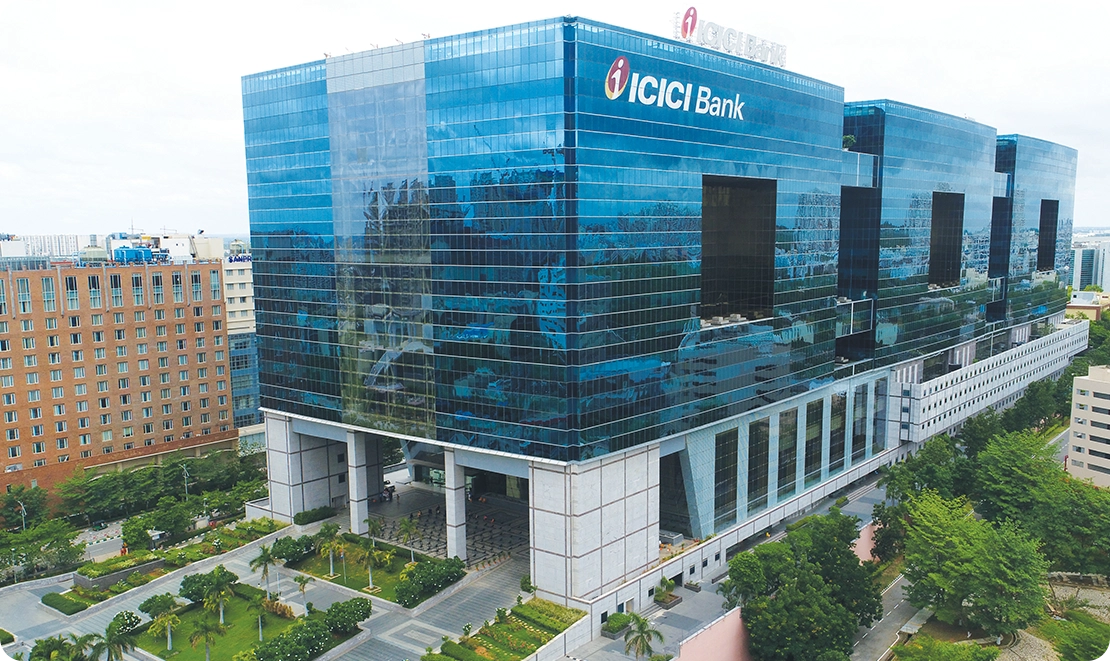ICICI Bank follows an integrated and responsible strategy for environmental and ecological conservation. The strategy is centred on the 4R (Reduce, Reuse, Recycle and Responsible disposal) principle and is driven by multiple initiatives designed to promote the use of environment-friendly practices. The Bank's ESG Policy emphasises its commitment to conduct business sustainably thereby reducing the environmental impact from its own premises and operations. The key areas of focus are digitisation, minimising greenhouse gas (GHG) emissions, energy conservation, water conservation, waste management and sustainable procurement.
The Bank implemented OHSAS 18001 at its 13 premises. ICICI Service Centre at Bandra-Kurla Complex (BKC) in Mumbai, Maharashtra is both OHSAS 18001:2007 and ISO 14001:2015 certified.
Conserving Energy
Our energy conservation strategy is based on a three-pronged approach that pivots on:
34%
Area of ICICI Bank is IGBC certified
Focus on Design
The designing of our buildings are guided by a strong focus on sustainability. We construct green workplaces that are compliant with the stringent Indian Green Building Council (IGBC) standards. IGBC certification is assessed on the key metrics of energy efficiency, use of renewable energy, water conservation, waste management, indoor air quality and sustainable sourcing of material among others. A total of 28 new sites spread over 2.87 million square feet of area were IGBC certified in fiscal 2023. Of these, nine buildings, including the Bank’s Regional Office at Gachibowli, Hyderabad, received the Platinum rating. This is the highest possible rating for sustainable practice in India. Another 16 buildings received the Gold rating. So far, we have received 154 IGBC certifications for branches and offices with a total of 4.42 million square feet of area, amounting to a little over one-third area of the Bank.
As part of our focus on design, we continue to invest in energy-efficient equipment including LED lights, Inverter and Variable Refrigerant Flow (VRF) air conditioning units, Modular Uninterruptible Power Source (UPS) and Energy Star labelled IT machines. This has helped us conserve raw materials, enhance asset utilisation and reduce wastage over the complete lifecycle of equipment. All the new branches added in fiscal 2023 were installed with energy-efficient equipment and water-efficient plumbing fixtures.
In the past eight years, ICICI Bank has substantially brought down the connected load per square feet – the total energy consumed by all electrical devices connected to an electric supply system – from 20 watts to 12 watts.
OHSAS 18001:2007 outlines an organisation's commitment to the health and safety of its employees, and ISO 14001:2015 lays down the requirements for an environmental management system.
Operations and Maintenance Practices
We deploy advanced technologies and energy-efficient processes to keep our operational emissions in check. We continuously monitor our energy usage to ensure that it does not exceed the defined parameters. In fiscal 2023, we consumed 197 million kilowatt-hour (kWh) of energy at our branches, offices and data centres. The energy intensity in terms of kilowatt-hours per square feet is equivalent to a 3-star rating as per the benchmark for buildings issued by the Bureau of Energy Efficiency. The cumulative yearly Power Usage Effectiveness (PUE) of our data centres was 1.55. It was better than the threshold of 1.63 as per the efficiency metric provided by 'The Green Grid' - a global consortium of organisations collaborating to improve the resource efficiency of information technology and data centres. PUE is a metric developed by the Green Grid widely accepted for measuring energy efficiency in data centres.
Energy-efficient temperature setting of 24°C is maintained across our offices and branches in accordance with ASHRAE (American Society of Heating, Refrigerating and Air Conditioning Engineers), a recognised standard for ventilation and acceptable indoor air conditions.
We saved nearly 14% in monthly energy consumption during fiscal 2023 by leveraging IoT (Internet of Things), a solution that can monitor and control the split AC, cassette AC and ductable units through a wireless system. The system is capable of setting the desired temperature, optimising the operations of AC units and fixing the running time of the AC units. We used IoT to monitor and control air-conditioning at our 73 offices and branches in Mumbai and National Capital Region (NCR). This also led to improvement in uptime while maintaining a comfortable temperature setting during the day. We installed eco-friendly Lithium-ion battery backup systems at some locations where use of diesel-generated power is not encouraged during winter. This alternative to diesel generators is contributing to reduction in emissions and pollution at these premises.
Our integrated maintenance portal, named iMaintain, enables on-time maintenance of critical equipment at our branches and offices by our service partners. This helps in optimisation of our energy consumption.
Renewable Energy Usage
We are actively engaged in the adoption of renewable energy (RE) to minimise harmful emissions and protect the environment. In fiscal 2023, the renewable energy usage at ICICI Bank was 17.08 million kilowatt-hour. This was 9% of our total energy consumption, up from 7% in fiscal 2022. We are continuously enhancing the usage of renewable energy at our premises.
We took a major leap in our RE journey with adoption of green tariff from electricity distribution companies (DISCOMs) in Maharashtra and Telangana. Green tariff is a special price offered by a DISCOM which enables large commercial and industrial customers to purchase bundled renewable electricity.
We regularly conduct energy audits of our premises, implement green practices and invest in advanced technology with an endeavour to lower our carbon footprint.
Renewable Energy Consumption (In million kWh)
3.32
On-site solar generation
1.68
Solar energy through open access arrangement
12.08
Renewable energy through green tariff
17.08
Total

Rooftop solar panel at ICICI Bank's Regional Office in Pune, Maharashtra
Energy Consumption (in giga joules)
| Particulars | Fiscal 2023 | Fiscal 2022 | ||
|---|---|---|---|---|
| Electricity consumption (A) | 683,713.12 | 558,943.73 | ||
| Fuel consumption (B) | 91,058.90 | 77,581.15 | ||
| Energy consumption through other sources (C)* | 11,967.75 | 11,569.60 | ||
| Total energy consumption (A+B+C) | 786,739.77 | 648,094.48 | ||
| Energy intensity per ₹ crore of turnover (total energy consumption/turnover in ₹ crore) | 6.10 | 6.18 | ||
| Energy intensity in terms of FTE employee | 6.10 | 6.12 |
Independent Study - Scope 1 and Scope 2 Emissions
The Bank continued with its practice to get an independent assurance of its Scope 1 and Scope 2 emissions. For fiscal 2023, the limited assurance assignment was taken up by DNV Business Assurance India Private Limited for the Bank’s operations at its large offices, data centres, business centres and offices. The limited assurance of Scope 1 and Scope 2 emissions for fiscal 2022 was conducted by TUV India Private Limited.
The year-on-year emissions intensity for total Scope 1 and Scope 2 (in tCO2e per FTE employee) has declined from 1.35 tCO2e in fiscal 2022 to 1.16 tCO2e in fiscal 2023. The Bank did not purchase carbon credits and related instruments during the year.
* This is from rooftop solar facility in own premises
One Full Time Equivalent (FTE) employee = One full time employee working on a full time schedule over the year
tCO2e – Tonnes of carbon dioxide equivalent. It is a standard unit for counting GHG emissions
GHG Emissions in Own Operations in Fiscal 2023:
| Emission category | Value (tCO2e) | |
|---|---|---|
| Owned cars (Scope 1) | 4.53 | |
| High speed diesel consumption in DGs (Scope 1) | 6,413.64 | |
| Refrigerant emissions (Scope 1) | 16,552.92 | |
| Fire extinguishers (Scope 1) | 844.12 | |
| Electricity purchased (Scope 2) | 125,950.45 |
GHG Emission Metrics:
| In ‘000 tCO2e | Fiscal 2021 | Fiscal 2022 | Fiscal 2023 | |||
|---|---|---|---|---|---|---|
| Scope 1 | 23 | 26 | 24 | |||
| Scope 2 | 114 | 116 | 126 | |||
| Scope 3 (business travel) | - | - | 18 | |||
| Total | 137 | 142 | 168 | |||
| Emission intensity for total Scope 1 and Scope 2 (in tCO2e per ₹ crore turnover) | 1.40 | 1.36 | 1.16 | |||
| Emissions intensity for total Scope 1 and Scope 2 (in tCO2e per FTE employee) | 1.39 | 1.35 | 1.16 |
Water Conservation
At ICICI Bank, it is our constant endeavour to ensure better water management and conservation.
As part of this endeavour, at the Regional Office at Gachibowli, Hyderabad in March 2023, we installed MEGHDOOT®, India’s first indigenous Atmospheric Water Generator (AWG) with a capacity of producing 500 litres of clean potable water per day from atmospheric moisture, without emitting carbon. The Environment Protection Training and Research Institute, a premier agency in India, approves this production process.
The potability test conducted on the water being produced by the generator proved satisfactory. It generates approximately 350 litres of drinking water a day, which is more than the requirement at this office, eliminating the need to purchase packaged water.
The initiative is aligned with our commitment to ensure water sustainability and reduce the use of plastic. We aim to gradually install AWGs in other premises too.
We have water recycling facilities at ICICI Service Centre at BKC in Mumbai, Maharashtra with a capacity of 80 Kilolitre per day (KLD) and at our office at Gachibowli in Hyderabad, Telangana with a capacity of 1,100 KLD. We are also continuously replacing old plumbing fixtures with new water-efficient ones. Our new offices and branches are pre-installed with water-efficient fixtures, compliant with IGBC guidelines.
Note:
Scope 1 emissions include CO2 emissions from the combustion of fuel in diesel-generating sets and company-owned vehicles, emissions due to loss of refrigerants and emissions due to CO2 based fire extinguishers. The emissions from diesel-generating sets was estimated using the spend-based method. The emissions from fire extinguishers and owned vehicles was based on actual consumption.
Scope 2 emissions are due to electricity purchased from the grid. The estimation was based on actual consumption of electricity, and using the grid emission factor published by the Central Electricity Authority, India.
Scope 3 emissions have been estimated for business-related travel by employees through modes like aircraft, train, buses, and cars. Emissions from hotel stay during such travel is not included. As per internal estimates, air travel contributed the highest emissions followed by car travel. For the purpose, DEFRA (Department for Environment, Food and Rural Affairs) 2022 emission factors have been considered
tCO2 e - Tonnes of carbon dioxide equivalent is a standard unit for counting GHG emissions.
Promoting Electric Vehicles
ICICI Bank is actively promoting the use of Electric Vehicles (EVs) among its employees in line with Government's efforts to enhance EV penetration in the country. We have installed EV charging stations at ICICI Bank Service Centre in BKC, Mumbai and ICICI Learning Centre at Khandala, Maharashtra. Our EV fleet at Gachibowli in Hyderabad, Telangana comprises 15 cars travelling nearly 66,000 kilometres per month.

Electric Vehicle charging station at ICICI Bank's Regional Office in Gachibowli, Hyderabad
Managing Waste
ICICI Bank has adopted practices for segregation and disposal of dry, wet and e-waste generated in its operations. We follow waste management practices in line with local and national regulations. These include:
- Composting of organic and wet waste at four large offices and facilities.
- Ensuring that e-waste is recycled or handed over to agencies authorised by State Pollution Control Boards.
- Reducing the consumption of dry waste (paper and cardboard) through digitalisation initiatives.

Wet waste composter at ICICI Bank's Regional Office in Gachibowli, Hyderabad
Case Study
ICICI Bank's Regional Office in Gachibowli, Hyderabad
IGBC Platinum Rating
ICICI Bank is committed to protecting the environment through dedicated measures. The IGBC Platinum rating for our Regional Office in Gachibowli, Hyderabad manifests our strong commitment towards environmental conservation. Our environment management initiatives at this office cover the areas of water conservation, energy efficiency, waste management, improved environmental conditions and enhanced fresh air ventilation.
Water Conservation
The Bank has installed a rainwater harvesting system designed to collect 10,000 KL of rainwater during the monsoon season, helping us to meet 8% of the total annual water requirement at the office. We have also successfully reduced water consumption by about 40% over the baseline provided in IGBC certification documents by installing water-efficient plumbing fixtures across the building. In addition, we are recycling 100% of the wastewater through a sewage treatment plant with a capacity of 1,100 KLD and using the recycled water in water closet (WC) flushing, landscaping and cooling towers.
Energy Efficiency
We have equipped the building with 100% LED lighting. The water-cooled chillers in the building are energy-efficient and have a COP (Coefficient of Performance) of over 5.81. The standard range of COP, which is the ratio of refrigeration required for heat removal to the chiller’s electrical energy demand, is estimated to be in the range of 4.2–8.8. We maintain the indoor room temperature at 24°C through a centralised air conditioning management system. We are also implementing the following additional measures to promote energy efficiency in the building:
- 100% green power through green tariff mechanism from Southern Power Distribution Company of Telangana Limited.
- A solar hot water system with a capacity of 6,000 litres per day for the hostel.
- Daylight harvesting in the tower enabling natural light in the atrium.
Waste Management
We have put in place a system for collection, segregation and disposal of different types of waste generated at the office. On-site segregation of dry and wet waste are being done by deploying different coloured dustbins and e-waste is being disposed through an authorised e-waste vendor. The organic fertiliser generated from waste food is used for gardening. We also use recycled paper along with refilled/recycled toners and cartridges within the office.
Fresh Air Units
We have installed fresh air units on the terrace to maintain optimum oxygen levels in the building. We have also introduced a three-stage air filtration process that includes installation of High-Efficiency Particulate Absorbing (HEPA) filters and Ultra Violet (UV) lamps in all the Air Handling Units (AHUs) to ensure better quality of indoor air. More than 500 indoor plants are placed in the building to supplement supply of fresh oxygen.
Green Transportation
The Bank has deployed 15 EVs for daily transportation of employees. These EVs travel about 66,000 kilometres and help in reduction of around 15 tCO2e every month.

ICICI Bank's regional office in Gachibowli, Hyderabad
Reducing Paper Consumption through Digitisation
ICICI Bank continues to invest in digitisation to promote environment conservation by reducing paper consumption. We are focussed on minimising our own paper consumption and the usage of paper in both internal and customer communications.
We have gone paperless in a wide range of customer communications like welcome letters, bank statements, credit card statements, Tax Deducted at Source (TDS) certificates, and loan amortisation letters by shifting to digital alternatives such as emails and SMS.
The e-KYC process, which was introduced in fiscal 2022, continued to result in significant paper savings during fiscal 2023. The requests for corporate salary processing was digitised for over 1,100 companies in fiscal 2023 which further contributed to paper conservation not only for the Bank but also for the companies.
We have started providing digital copies of property documents to our customers, post disbursement of mortgage loans. The Bank also started sending PINs to pre-paid card holders via SMS and email instead of delivering physical kits.
The Bank digitised the Drawing Power (DP) updating process, allowing customers to submit their stock statements digitally through the Corporate Internet Banking (CIB) platform and check the submission status online. Easysign is another digital project that helped in paper savings during the year by enabling document signing through Aadhaar-enabled authentication. The practice of sending ‘Annual Physical Portfolio Statements’ to Personal Banking (PB) clients has been discontinued, adding to the Bank’s paper saving initiatives.
These initiatives helped ICICI Bank to save a total of over 6.5 million A4 size paper in fiscal 2023, which is equivalent to saving around 800 trees and nearly four million litres of water.
Additionally, the Bank has moved to using FSC (Forest Stewardship Council) certified recycled paper for pre-printed forms at its branches. This has resulted in about 37% reduction in carbon emissions compared to conventional paper.
As per estimates, 8,333 sheets can be made from a tree and around 500 ml water is required to produce one sheet.
Over 6.5 million
A4 size paper saved in fiscal 2023